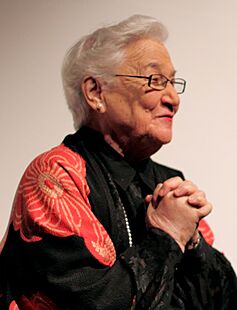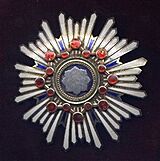Beate Sirota Gordon facts for kids
Quick facts for kids
Beate Sirota Gordon
|
|
|---|---|

Gordon at the Japan Society in 2011
|
|
| Born |
Beate Sirota
October 25, 1923 Vienna, Austria
|
| Died | December 30, 2012 (aged 89) Manhattan, New York City, U.S.
|
| Citizenship | United States |
| Alma mater | Mills College |
| Occupation | Performing arts presenter |
| Years active | 1943–2012 |
| Organization | |
| Spouse(s) |
Joseph Gordon
(m. 1948; died 2012) |
| Children | 2 |
| Parent(s) |
|
| Relatives | Jascha Horenstein (uncle) |
| Awards |
|
Beate Sirota Gordon (October 25, 1923 – December 30, 2012) was an important person who worked to bring different cultures together through art. She also fought for women's rights. Born in Vienna, Austria, she moved to Japan in 1929 with her father, who was a famous piano player.
After finishing school in Japan, she went to college in California. Because she was one of the few non-Japanese people who spoke fluent Japanese, she got a job helping during World War II. After the war, Beate returned to Japan. She worked as a translator for Douglas MacArthur, who was in charge of the Allied forces there. She played a key role in writing Japan's new constitution, making sure it included equal rights for men and women.
Later, Beate Sirota Gordon came back to the United States. She became the director of performing arts for the Japan Society and the Asia Society. In these roles, she helped many Japanese and Asian artists share their work in the U.S. She retired in 1991.
Contents
Early Life and School Years
Beate Sirota was born in Vienna, Austria, on October 25, 1923. She was the only child of Leo and Augustine Sirota. Her parents were of Russian-Jewish background. Her father, Leo, was a talented pianist. He moved from Russia because of violence against Jewish people. Beate's uncle, Jascha Horenstein, was also a famous conductor.
In 1929, Beate's family moved to Tokyo, Japan. Her father was invited to teach music at the Imperial Academy of Music. Beate first went to the German School in Tokyo. When she was twelve, her parents decided to move her to the American School in Japan. They felt the German School was becoming too influenced by the Nazi party.
Beate lived in Tokyo for ten years. In 1939, she moved to Oakland, California, to attend Mills College. She studied modern languages and graduated in 1943. In January 1945, she became a citizen of the United States.
Helping Japan After World War II
During World War II, Beate was separated from her parents, who were still in Japan. She later shared that in 1940, she was one of only about 65 non-Japanese people in the U.S. who spoke fluent Japanese. During the war, she used her language skills to work for the U.S. government.
As soon as the war ended, Beate went to Japan to find her parents. They had survived the war. On Christmas Eve, 1945, she was the first civilian woman to arrive in Japan after the war. She worked as a translator for Douglas MacArthur's army, which was helping to rebuild Japan. Beate could speak many languages, including Japanese, English, German, French, and Russian.
Writing Japan's New Constitution
In February 1946, the U.S. began to help Japan write a new constitution. Beate was asked to join the team. She was part of a group that wrote the section about civil rights. She was one of only two women on this important team.
Beate played a huge part in writing the laws about equal rights for men and women in Japan. She helped create Articles 14 and 24 of the constitution.
- Article 14 says: "All people are equal under the law. There should be no unfair treatment in politics, money matters, or social life because of a person's race, beliefs, sex, social standing, or family background."
- Article 24 says: "Marriage should only happen if both people agree. It should be based on working together with equal rights for husband and wife. Laws about choosing a partner, property, inheritance, where to live, divorce, and family matters should respect each person's dignity and the equal rights of men and women."
These additions were very important for women's rights in Japan. Before this, Japanese women had very few rights. Beate was the only woman present during the important talks between the Japanese and American teams.
A Career in the Arts
After returning to the United States in 1948, Beate married Joseph Gordon. He had also worked as a translator in Japan. They settled in New York. Beate had always loved the performing arts. She had studied dance, piano, and drama.
In 1954, she joined the Japan Society in New York City. She helped Japanese students in New York with their careers. One of these students was Yoko Ono, who became a lifelong friend. Beate also worked with visual artists, setting up art shows.
In 1958, she became the Japan Society's Director of Performing Arts. In this role, she introduced many Japanese artists to audiences in New York. She helped artists like Toshi Ichiyanagi, a famous composer, and Suzushi Hanayagi, a dancer.
In 1960, Beate also started working as a consultant for the Asia Society's performing arts program. This allowed her to bring artists from other Asian countries, not just Japan, to the U.S.
Bringing Asian Arts to America
Beate Gordon helped bring koto music to the attention of Americans. She introduced a famous koto player, Kimio Eto, to composer Henry Cowell. Cowell then wrote a concerto for koto and orchestra. Beate also organized the first Asian performances at the Lincoln Center for the Performing Arts.
To find amazing artists, Beate traveled to many faraway places in Asia. She looked for traditional performers to bring to universities, museums, and cultural centers across the U.S. and Canada. Over the years, she organized 39 tours by 34 groups from 16 countries. These shows were seen by about 1.5 million Americans in many cities. They helped Americans learn about and appreciate Asian dance, theater, and music.
Beate also produced and hosted TV shows about Japanese arts. She made video tapes and films that were shown across the country. She also produced music albums featuring Asian music.
Awards and Retirement
Beate Sirota Gordon received many awards for her work in the arts. These included the American Dance Guild Award (1978) and the Obie Award (1985). In 1990, she received a Bessie Award for "building a path between the cultures of East and West." She also received the John D. Rockefeller Award in 1997 for introducing Asian performing arts to American audiences.
Beate retired from the Asia Society in 1991. She received honorary degrees from Mills College in 1991 and 2011, and from Smith College in 2008. In November 1998, the Japanese government gave her a special award called the Order of the Sacred Treasure.
A Japanese TV network made a documentary about Beate's life in 1993. A book about her role in writing the Japanese constitution was published in 1995. The English version, called The Only Woman in the Room: A Memoir, came out in 1998. A play based on her story was also performed in Tokyo. Beate often gave talks about her important work on the Japanese constitution.
A small planet, 5559 Beategordon, was named in her honor. A children's book celebrating her work for equal rights was published in 2020 by Jeff Gottesfeld.
Later Life and Passing
Beate Sirota Gordon passed away on December 30, 2012, in New York City, at the age of 89. Her last public message was to ask people to protect the peace and women's rights parts of the Japanese Constitution. Her husband, Joseph Gordon, had passed away a few months earlier.
Selected Works
Beate Sirota Gordon wrote and contributed to several books:
- Introduction to Asian Dance (1964)
- An Introduction to the Dance of India, China, Korea [and] Japan (1965)
- 1945年のクリスマス: 日本国憲法に「男女平等」を書いた女性の自伝 (1995) (This is a Japanese book about her life.)
- The Only Woman in the Room: A Memoir (1997)
She also participated in many oral history projects, sharing her memories with others.
 | Stephanie Wilson |
 | Charles Bolden |
 | Ronald McNair |
 | Frederick D. Gregory |


